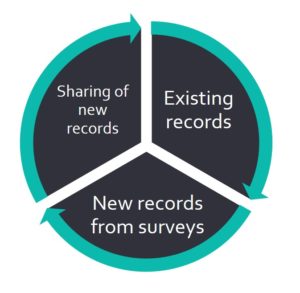Sharing of data from planning applications means that the existing evidence base is enhanced and enables data to be re-used in decision making. However, from more than 7 million species records held by GiGL, less than 1% have come from consultants working in the planning process.
Importance of data standards.
GiGL does not have the capacity to extract new data from ecology reports. So, it is important that data are shared with us following our data standards and in formats that can be easily incorporated in our existing datasets.
Importance of setting up a process
It is important that a process is in place that works for all parties involved. Local Planning Authorities (LPAs) should have clear requirements for data sharing (specifying the need for data standards) and the proof they require that this has happened. The process should be straightforward and time-efficient for ecological consultants. Ecological consultants may include in their contracts that data will be shared with GiGL and explain to developers the importance of sharing data and the existing requirements. Construction professionals should consider reviewing their Ecological Scope of Works to facilitate data sharing.
Contact us if you would like to discuss further about the process and the specific requirements.

Example wording
- Policy: Developments are required to share newly acquired natural environment data (e.g. habitats, species, green infrastructure features) with Greenspace Information for Greater London CIC (GiGL), London’s environmental records centre, following GiGL’s data standards.
- Planning application requirement: Newly acquired data on the natural environment (e.g. habitats, species, green infrastructure features) should be shared with Greenspace Information for Greater London CIC (GiGL), London’s environmental records centre, following GiGL’s data standards.
- Condition: In the interests of maintaining comprehensive source of environmental data for Greater London and to ensure development in the borough protects and enhances the borough’s biodiversity and geodiversity assets in accordance with Local Plan Policy X, evidence should be provided to the Local Authority that natural environment data (e.g. habitats, species, green infrastructure features) from ecological surveys have been shared after surveys are completed, with Greenspace Information for Greater London CIC (GiGL), London’s environmental records centre, following GiGL’s data standards. Proof should be provided that the data have been shared.
- Consultant Contract term: Newly acquired data on the natural environment (e.g. habitats, species, green infrastructure features) will be shared with Greenspace Information for Greater London CIC (GiGL), London’s environmental records centre, following GiGL’s data standards.
References to recommendations for data sharing
- Guidelines For Accessing, Using and Sharing Biodiversity Data In The UK (March 2020) (link)
1. “It is expected that following the completion of surveys, all relevant biodiversity data obtained will be submitted to the relevant LERCs and other groups as appropriate, unless the client has expressly refused permission for this12. A statement to this effect should be included in the consultants’ Terms and Conditions. Data can be submitted direct to the LERC. Note that where a protected species licence is required, submission of such data by the stated deadline is a requirement of the licence.”.
- Guidelines For Ecological Impact Assessment In The UK and Ireland Terrestrial, Freshwater, Coastal and Marine (updated April 2022) (link)
14 “Account needs to be taken of existing information and understanding, in conjunction with the results of EcIAs undertaken elsewhere. CIEEM encourages all practitioners to share data and results, for example through Local Record Centres (LRCs) in Britain27…”.
- Defra guidance: Complying with the biodiversity duty (May 2023) (link)
Prepare for biodiversity net gain: “You can get existing local data from Local Environmental Record Centres. If you commission research, you can share that data with them.”
- Biodiversity gain plan (March 2024) (link)
Section 10: Sharing data (optional): “Can we share your ecological survey data with the Local Environmental Records Centre or other bodies?”
- The Institution of Environmental Sciences and the Association of Local Government Ecologists report ‘BNG in Practice: One year on from mandatory implementation’ (February 2025) (link)
Good BNG data: 3.4 – “Defra should make the biodiversity gain plan template fully digitalised. The option to share data with Local Environmental Record Centres (LERCs) should be made mandatory (Question 10).”
21st century habitat monitoring: 6.4 – “LPAs should make it mandatory for developers to share on-site monitoring data with LERCs through planning application or supplementary planning guidance requirements.”
- Geospatial commission’s (May 2021) report
Data Use Recommendations: 12. “Mandate the re-use of species data collected by consultants in transparent processes that support regulatory compliance, potentially through new regulation. This will reduce survey costs, improve professional standards and support environmental outcomes”.
Further reading
Read some articles on this topic and about work in collaboration with Build UK
- Sharing is Caring, GiGLer article (2016).
- Surveying Consultants’ Attitudes to LRCs and Biodiversity Data, ALERC (2012).
- Sharing Ecological Data Using GIS Files, in CIEEM’s inpractice bulletin (p. 51) (2016).
- We all need to be data aware, International Association for Landscape Ecology (ialeUK) (2016).
- Share your data!, Landscape Institute (2016).
